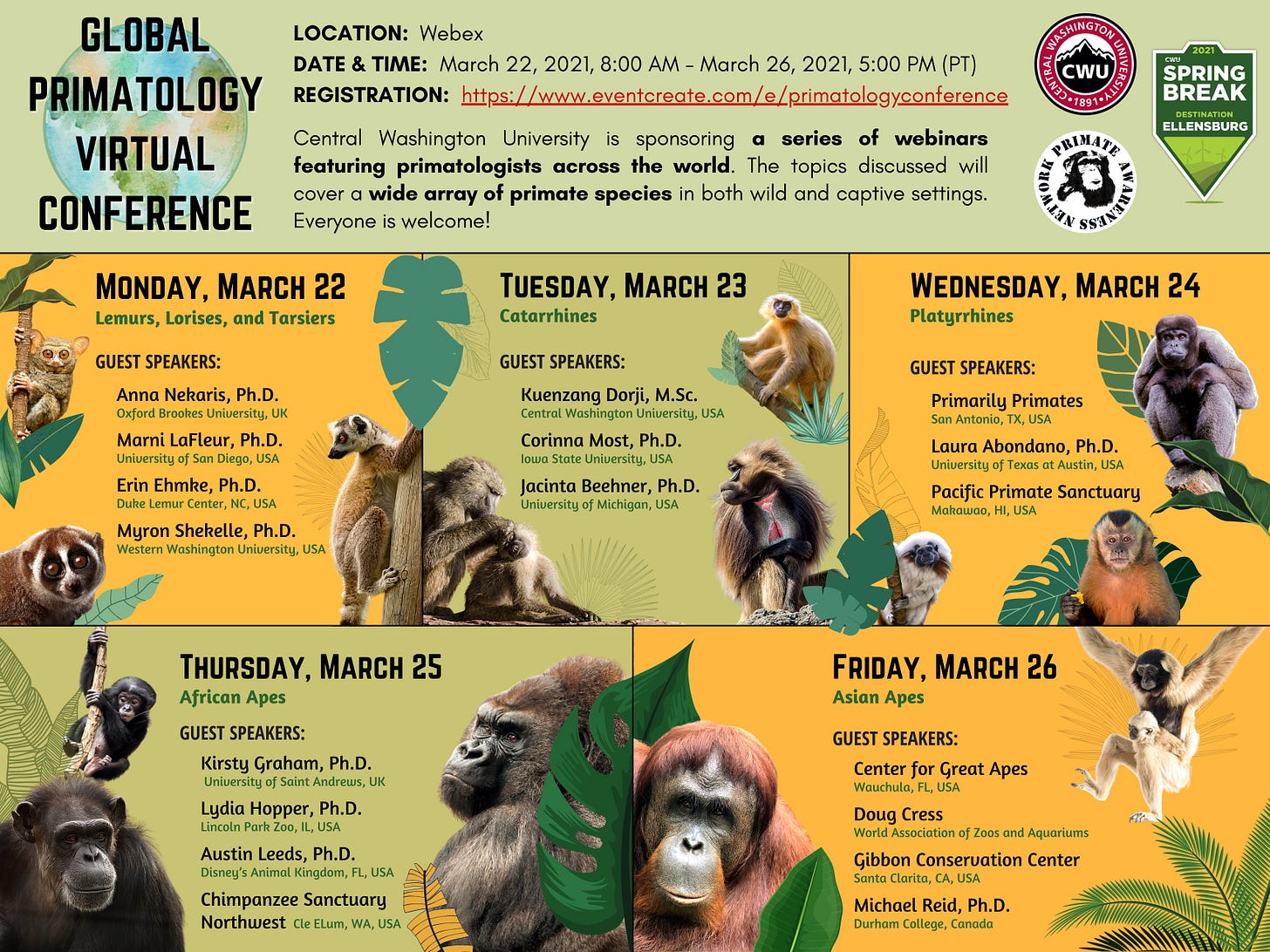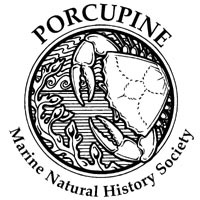Online Ecology Conferences
This Specialization will give you rigorous training in the R language, including the skills for handling complex data, building R packages, and developing custom data visualizations. You’ll be introduced to indispensable R libraries for data manipulation, like tidyverse, and data visualization and graphics, like ggplot2. You’ll learn modern software development practices to build tools that are highly reusable, modular, and suitable for use in a team-based environment.
Global Primatology Virtual Conference
Date: March 22nd - 26th
Conference Theme
Central Washington University (CWU) invites you to a virtual global primatology conference, which will convene experts on Lemurs, Lorises, Tarsiers, Monkeys, and Apes from around the world. Our extraordinary line-up of presentations will allow attendees the opportunity to visit and learn about a diverse array of primate species and the research and conservation work being done in sanctuaries, zoos, and natural environments across the world. Each presentation will be followed by 30 minutes for questions and interaction, allowing attendees the opportunity to connect in meaningful ways with leading primatologists.
International Meeting on Zoo Research, Conservation and Biodiversity
Date: March 19th
Registration Deadline: March 17th
Conference Theme
This yearly meeting will provide a platform for scientists, academia, zoo researchers and all persons interested to discuss and exchange information on new science-based innovations and research topics that will offer perspectives and future-oriented solutions to biodiversity changes, while also addressing environmental sustainability.
A. Science-policy interaction
Politics and science must work closely together to develop successful conservation strategies and principles to preserving biodiversity. Within this context, the first conference theme aims to examine in greater detail, the problems arising from the loss of biodiversity that may require policy change actions, such as invasive species management and reduced genetic variability. The last topic in this theme is the use of nature-based solutions to protect and restore ecosystem functioning.
B. Comparative animal behaviour and adaptations
This second conference theme highlights the understanding of cognitive abilities and mechanisms in nonhuman species under comparative cognition. It also focuses on how cognitive abilities and specific behaviour can aid interactions, adaptation and survival in the natural environment. Under this theme, researchers can also present their work, discuss their latest findings and share their research-based perspectives on the question, „How do we move forward while anticipating future consequences?“
Conservation Career Kick-Starter | Online course
The Conservation Career Kick-Starter is designed to help you get clear, get ready, and get hired in the conservation sector. Through the course you’ll create a personal career plan for starting work as a professional wildlife conservationist.
You’ll be guided by the experts at Conservation Careers and learn how the jobs in the sector, which one is right for you, what education and experience you need, how to apply and, how to get hired at interviews.
It will give you confidence in your job hunt and will make everything quicker, simpler and more fun!
The Conservation Career Kick-Starter includes:
Support from Conservation Careers via email, Zoom and in a private Facebook group.
3 Step-by-Step Modules organised into 17 Units to do at your own pace.
Be part of a community of course-mates from across the globe to share ideas, ask questions and support one another.
A workbook guiding you through a series of practical tasks, capturing all your learning, ‘ah-ha’ moments and key next steps.
You also get a year’s enrolment into the Conservation Careers Academy, which gives you access to around 10,000 conservation jobs each year plus lots more.
Everyone who completes the course receives a certificate.
4th Forum on Ecological and Economic Impacts of Invasive Species: Innovation Driven by Biological Invasions
Date: March 15th - 18th
Conference Theme
The Economic and Environmental Impacts of Invasive Species Scientific Forum, held by the Invasive Species Bioengineering Center (CBEIH), presents its fourth edition. The theme of this edition is Innovations Driven by Biological Invasions.
Since the first edition, in 2014, the Forum has counted on the participation of researchers, industry, students and companies and discusses the issue of invasive species with a complex, systemic and multidisciplinary approach.
In this edition, the technologies and innovation that arose or were driven by biological invasions will be discussed. The talks and round tables will have the participation of great national and international names on topics such as Ecology, Bioengineering, Biomimetics, Robotics, Molecular Biology, Biomaterials, Biological Invasions, Anthropology and Society, among others.
Visualizing Biological Data
Date: March 24th - 26th
Abstract Submission Deadline: March 15th
Conference Theme
VIZBI 2021 is the 11th international meeting on Visualizing Biological Data. It will be held as an EMBL virtual conference, from March 24–26. The conference will feature talks from 21 world-leading researchers showcasing visualizations transforming how life scientists view data, and driving key advances in molecular biology, systems biology, biomedical science, and ecology. The conference brings together a diverse community, including bioinformaticians, data scientists, computer scientists, and experimentalists, as well as medical illustrators, graphic designers, and graphic artists. All participants will have the opportunity to present a poster and lightning talk describing their work.
Porcupine Marine Natural History Conference
Date: March 27th
Conference Theme
Once again, we invite you to join us to share in our fascination for all things marine. This year’s theme is “Connecting to our coasts” – A one-day virtual conference for those with a passion for marine natural history. This will be an opportunity to experience the creativity, ingenuity, and even serendipity, that have enabled the marine community to maintain and enhance their connections to our coasts. Sessions will include presentations, workshops, and informal opportunities to connect with experts and like-minded people.







